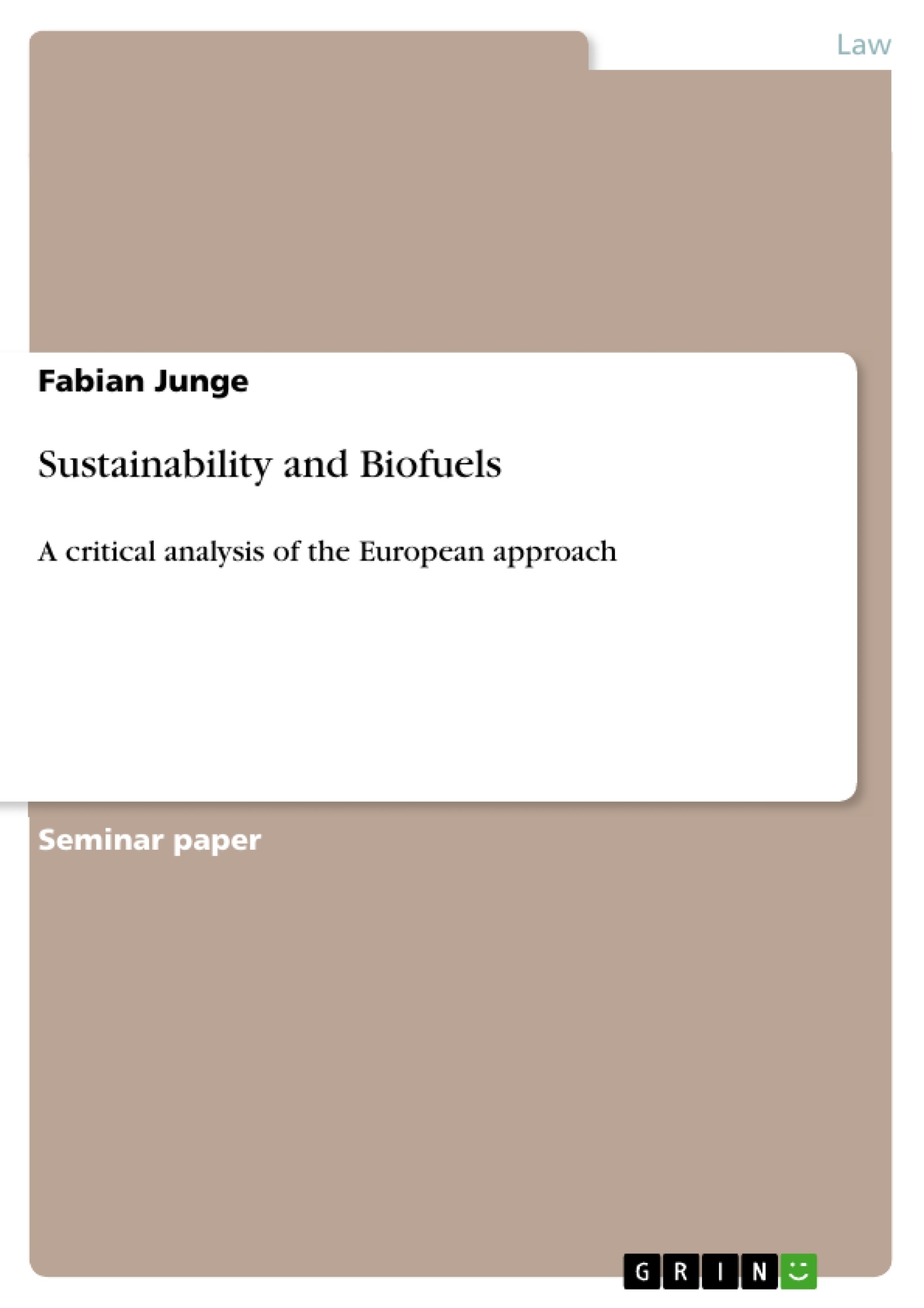Climate change and climate protection can be considered as the most controversial and most discussed topics in the 21st century. Especially, since the Intergovernmental Panel on Climate Change released its 4th Assessment Report on Climate Change in 2007 stating that climate change is indeed mainly caused by human activities. Hence, policy-makers all over the world are taking responsibility for climate protection in order to compensate for society’s faults. 1
The European Union sees itself as one of the driving forces behind fighting climate change and is keen to create and encourage policies or developments that might support their efforts. As proposed in the Lisbon and Gothenburg in 2000 and 2001, the European Union wants to be the most competitive and dynamic knowledge-based economy with a sustainable growth, more social cohesion as well as respect for the environment. One of the opportunities to achieve this objective is bioenergy, or in particular biofuels, which may allow for the reduction of greenhouse gas emissions, more energy security as well as the promotion of sustainable development globally and the creation of new markets. Biofuels can be defined as solid, liquid or gas fuel consisting of, or derived from biomass, which is composed of living and recently dead biological material. The best-known products are bioethanol and biodiesel, which are first generation biofuels derived from renewable resources, in particular food crops. Second generation biofuels, e.g. lignocellulosic biomass, vary in the fact that they are manufactured from non-food crops.
To use this opportunity, the European Union crowned its preceding efforts with respect to renewable energy sources like biofuels with the release of the ambitious climate and energy policy package in January 2008. It contained various proposals for Directives including binding targets for greenhouse gas reductions, energy savings and the share of renewable energy in the total energy consumption. As a result of the long-term policy support covered by the European Union, the biofuels production has increased rigorously.
Inhaltsverzeichnis (Table of Contents)
- A. Introduction
- B. The European Framework on Biofuels
- I. In General
- II. The current European Framework
- C. Critical analysis of the sustainability criteria
- I. The concept of sustainability
- II. The existing criteria
- 1. Greenhouse gas emissions reduction according to Art. 17 (2)
- 2. Protection of biodiversity according to Art. 17 (3)
- 3. Conclusion
- III. Not covered conflicts
- 1. Water concerns
- 2. Air quality
- 3. Impacts on third countries
- IV. The certification schemes
- D. Conclusion
Zielsetzung und Themenschwerpunkte (Objectives and Key Themes)
This term paper critically analyzes the European approach to sustainability in the context of biofuels. It aims to assess the current European framework for biofuels, focusing on the sustainability criteria and their effectiveness in addressing environmental concerns. The paper also explores the limitations of the existing framework, identifying areas where further development and improvement are needed.
- Sustainability criteria for biofuels in the European Union
- The effectiveness of the current framework in addressing environmental concerns
- The limitations and potential conflicts related to the existing sustainability criteria
- The role of certification schemes in promoting sustainable biofuel production
- The implications of the European biofuels policy on global environmental issues
Zusammenfassung der Kapitel (Chapter Summaries)
The first section introduces the topic of biofuels and their role in achieving sustainability goals. It lays out the central argument of the paper and outlines the structure of the analysis. The second section explores the European framework on biofuels, providing a comprehensive overview of the existing regulations and policies. It examines the development of the European framework and highlights the key goals and objectives of the current approach. The third section delves into a critical analysis of the sustainability criteria implemented in the European framework. It explores the concept of sustainability in the context of biofuels, examining the existing criteria in detail. This section also discusses the limitations of the existing framework, highlighting the challenges and conflicts that have not been adequately addressed. The fourth section discusses the role of certification schemes in promoting sustainable biofuel production. It examines the different certification schemes available and assesses their effectiveness in ensuring sustainability compliance.
Schlüsselwörter (Keywords)
The central themes of this paper include biofuels, sustainability, environmental policy, European Union, sustainability criteria, certification schemes, greenhouse gas emissions, biodiversity, water resources, air quality, and global environmental impacts. The paper explores the interplay between these key concepts and analyzes the effectiveness of the European framework in promoting sustainable biofuel production.
Frequently Asked Questions
What are the EU's sustainability criteria for biofuels?
The criteria focus on greenhouse gas emission reductions (Art. 17.2) and the protection of biodiversity and land with high carbon stock (Art. 17.3).
What is the difference between first and second-generation biofuels?
First-generation biofuels are derived from food crops (like corn or sugar cane), while second-generation biofuels are made from non-food biomass, such as lignocellulosic materials.
What are the limitations of the current EU framework on biofuels?
The framework is criticized for not adequately addressing water concerns, air quality, and the socio-economic impacts on third-party developing countries.
How do certification schemes ensure biofuel sustainability?
Certification schemes are used to verify that biofuel production complies with environmental standards, though their effectiveness varies depending on the specific scheme used.
Why did the EU introduce a climate and energy policy package in 2008?
The package aimed to set binding targets for greenhouse gas reductions and increase the share of renewable energy to fight climate change and improve energy security.
- Citation du texte
- Fabian Junge (Auteur), 2012, Sustainability and Biofuels, Munich, GRIN Verlag, https://www.grin.com/document/192064



